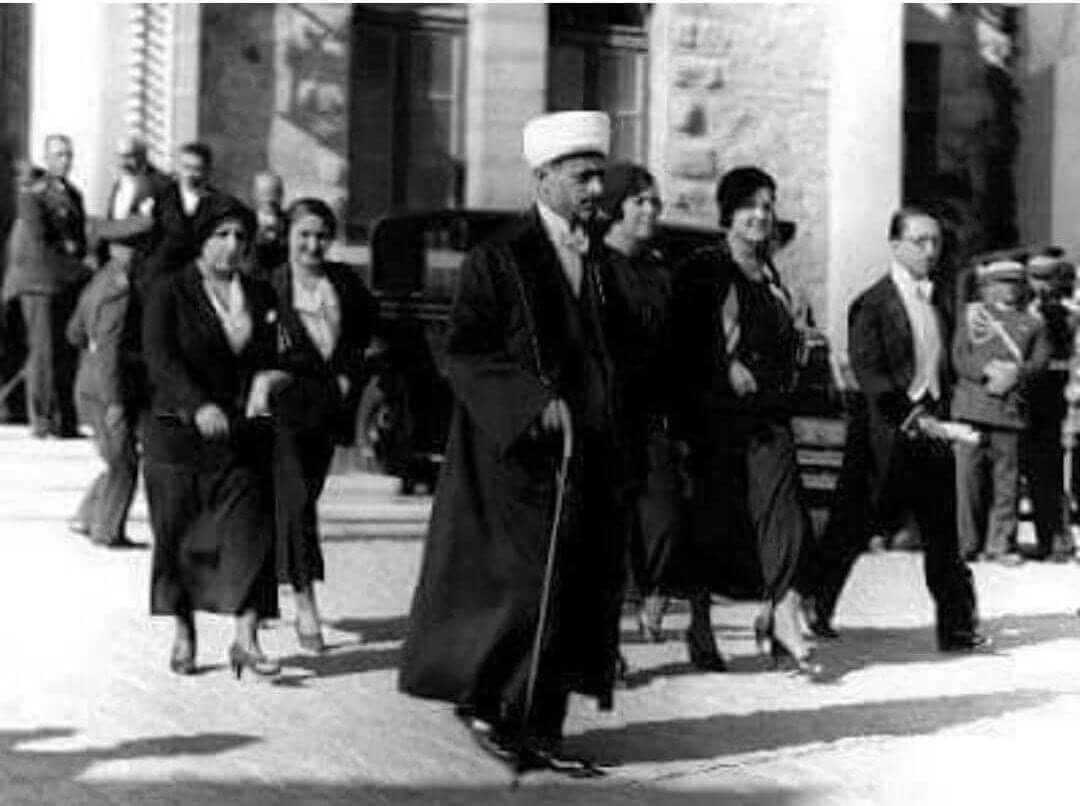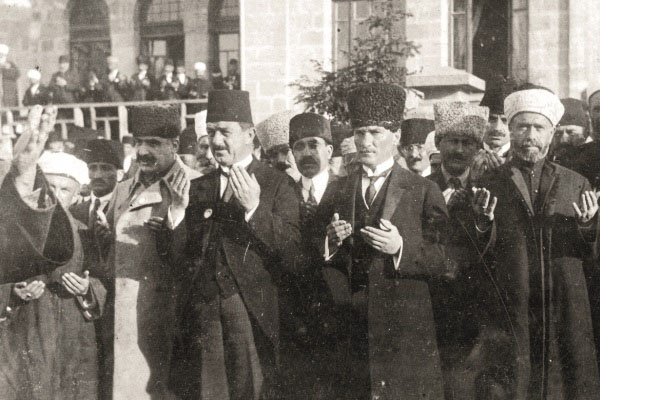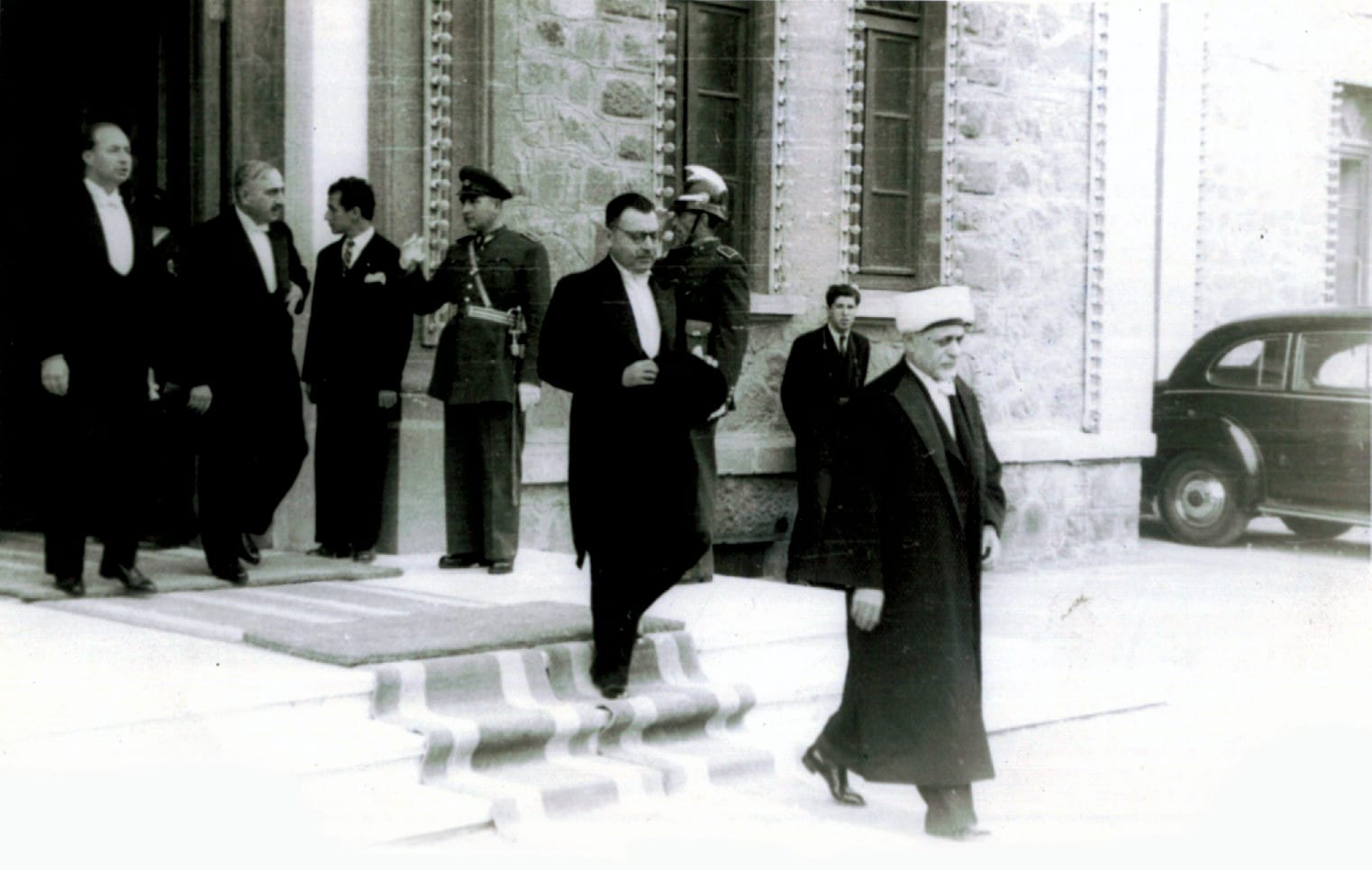(1).png)
WHAT IS LAICISM? WHAT IS IT NOT?
The Journey of Laicism
The Republic of Türkiye claimed to be an Islamic state when it was founded. In the Republic Constitution named the Teşkilat-ı Esasiye Kanunu, adopted on April 20, 1924, there is a clause stating, "The religion of the state is Islam."
In his memoirs, İsmet İnönü states: "To give the impression that our actions and reforms were not contrary to the Islamic religion, this provision was preserved in the 1924 constitution." (II/190)
Nevertheless, despite this clause, the Ministry of Sharia and Foundations (Waqfs), responsible for the application of the caliphate and Sharia provisions, was abolished, and the Directorate of Religious Affairs, tasked with manipulating the religious affairs of Sunni Muslims by the state, was established in violation of laicism. Madrasas were closed in 1924, and dervish lodges were shut down in 1925. In 1926, the Swiss Civil Code was adopted, putting an end to the application of Islamic law.
Finally, this clause was removed with an amendment on April 10, 1928, and in 1937, the principle of laicism was explicitly incorporated into the constitution along with the 6 arrows of the CHP (Republican People's Party).

Clergy and Laity
In Christianity, there is a clergy class responsible for religious affairs, organized with a hierarchy and order. In medieval Europe, the clergy (clericus) and the laity (laicus) were divided into two categories. Laity refers to a person who is not part of the clergy, meaning laical or non-religious.
During the Middle Ages, the clergy had significant influence over the people and rulers. Laicism emerged in response to this. The influence of religion on states gradually weakened over time but did not completely disappear because the population remained predominantly Christian. Laicism is not a legal concept; it is a philosophical, social, and political idea with roots in European history.
Contrary to the spread of laicism from France, there is a concept of secularism in the Anglo-Saxon world. Human (and government) actions have two aspects: religious and secular. The secular (worldly) aspect refers to permissible actions in religion, meaning areas where religion does not give definitive rulings (such as drinking tea) and grants freedom to individuals.
In the Ottoman Empire, there was no clergy class. Religious figures were represented by the scholarly class known as "ilmiye", consisting of judges (qadis), legal advisors (muftis), and scholars (mudarriseen). The Sultan was not a spiritual leader; he was the holder of secular authority. The Ottoman State was not a theocracy like the Papacy, Tibet, or Iran. It had a legal system based on Islamic principles, but non-Muslims could follow their own legal systems if they chose, with their own courts and judges.
Freedom for All Religions
Islamic-Ottoman law grants individuals, regardless of whether they are Muslim or not, broad rights and freedoms. Moreover, Sharia law provides Muslims the opportunity to live in peace and security alongside members of other religions and communities ("the other") even in systems governed by non-Muslims.
Freedom of religion and conscience was not granted by the Sultan as a favor or under foreign pressure. It was not something given by outsiders. Rather, it was safeguarded by the law itself, a provision of domestic legislation. No one can be deprived of the freedom to practice, learn, teach, and worship their religion. Not even the Sultan has the authority to do so.
The 11th Article of the 1876 Ottoman Constitution, the first modern Ottoman constitution, reads as follows: "The religion of the Ottoman State is Islam. Along with the preservation of this principle, the freedom of all known religions in the Ottoman territories to practice their beliefs, provided that they do not violate public order and general morals, and the implementation of the privileges granted to various communities in terms of religious matters, are under the protection of the state."
Societal Pressure
The Ottoman Sultan cannot change Sharia law at his discretion. However, he can enact laws as long as they do not contradict this law. The ulama (religious scholars) oversee this. Although there is no punishment for non-compliance with fatwas (religious rulings), the caliph, who is regarded as the representative of the Prophet according to Islamic tradition, cannot risk acting contrary to existing legal norms in the eyes of the public. Otherwise, he may lose his legitimacy. This is not merely a local issue but societal pressure!
The German orientalist Joseph Schacht states that the Ottoman Empire provides one of the most notable and successful examples of making the practical implementation of the state conform to the provisions of Sharia law.It is natural that deviations in practice, in other words, exceptions, do not break the rule. Political pragmatism is one thing, laicism is another.
Definition of Laicism
Laicism means replacing divine will with human will. It is a system where laws are not based on religious principles, and the state maintains equal distance from all religions, refraining from interfering in anyone's religion. Laicism emerged as a reaction to the political authority of the clergy, rather than a reaction to religion and religious law.
In Islamic Law, governments and legal systems derive their legitimacy from religious principles. This is because Islam regulates not only people's beliefs and worship but also worldly matters such as marriage, divorce, inheritance, competence, property, and transactions. Performing these actions in accordance with religion is also a religious duty. Failing to allow for this opportunity would hinder the fulfillment of religious duties.
Freedom of religion and conscience is distinct from laicism. If an irreligious person is compelled to believe in religion or if a member of a religion is forced to abide by the commands and prohibitions of another religion (for example, if an unveiled woman is compelled to cover her head or if a veiled woman is forced to uncover her head), then this is contrary to laicism.
In democracy, minority rights are protected, and even non-laical states can adhere to this principle. Disregarding the legal provisions of religions, hindering their application in the name of laicism, is not only contrary to freedom of religion and conscience but also constitutes a violation of laicism itself.
Marriage between siblings is religiously prohibited and, according to the law, it is also forbidden. In Israel, the Sharia-based Mecelle (the civil code of the Ottoman Empire) is partially applied. The French civil code, Code Civil, includes many provisions inspired by Islamic law. Are these a violation of laicism? Certainly not! Because the acceptance of these provisions is not obligatory but discretionary.

Laicism and Democracy
Therefore: 1- If it is accepted that state actions must necessarily comply with religious principles; 2- If the people are compelled to adhere to religious principles; 3- If the state controls and regulates any religion, then it can be said that laicism is being violated.
Laicism is neither a prerequisite for democracy nor for human rights. Indeed, there are countries like the United Kingdom, Denmark, and Sweden where democracy and human rights function excellently without being laical.
In the United Kingdom, the Queen is the head of the Anglican Church. There, 26 bishops are members of Parliament and hold a prominent position in protocol. In Sweden, the government supports the Protestant Church. "In God We Trust" is written on the most prestigious currency in the world, and the President of the United States begins his term by swearing on the Bible.
In contrast, numerous relentless dictatorships in Africa and Asia, such as North Korea, the Soviet Union, and Myanmar, champions of human rights violations, strictly adhere to laicism.
Since 1905
In France, where priests can walk the streets freely swinging their cassocks, the church holds significant influence. Thousands of students attend Catholic schools. Christians can marry and divorce in the church. Today, it is not without reason that France questions and attempts to relax its laicism within its own country. Politicians believe that the France of 1905, when laicism was established, is not the same as today's France.
When religious legal principles are accepted in a country based on the majority's desire, it cannot be called laicism, but there is democracy. Conversely, when non-religious principles are accepted by the order of a dictator against the will of the people, there is laicism but no democracy. So, what happens when human will aligns with divine will? In this case, is there laicism or not?
In the modern conception of state and society, democracy and human rights are accepted as universal principles; however, not laicism. Viewing laicism as a prerequisite for democracy is a widespread misconception, akin to mistaking republicanism for democracy.
State control
Explaining why the state in the Ottoman Empire had control over religion is straightforward. This is because it was a state based on a religion. Among its duties were spreading the religion and protecting it and its believers from destructive forces. However, neither the imams received salaries from the state, nor did the state determine the fatwas and sermons to be delivered, nor could it seize the endowment incomes of the mosques. The position of the Sheikh al-Islam was consultative rather than executive. The Sheikh al-Islam was not even a member of the Imperial Council. His inclusion in the cabinet during the reign of Sultan Mahmud II was aimed at increasing the authority of central administration.
Why does a laical state control religion? Why does it consider religious leaders as state officials? Why does it regulate the execution of religious rituals, sermons, Friday prayers, and religious education?
Even if some specific reasons are put forward, understanding this is indeed quite difficult. At a time when the role of religion in worldly life has significantly diminished, the concern about reverting to a theocratic order is nothing more than paranoia. It is a fact that Türkiye made a significant choice to move away from Sharia law a hundred years ago. Reversing this choice is not easy, even if everyone wants it, because Islam requires a legal system with a serious infrastructure, which is currently not available anywhere in the world.

Legal Pluralism
The Ottoman system, which stood equidistant from other religions, continued to exert its influence in the Balkan countries that separated from the Ottoman Empire. In these countries, the Muslim population adhered to their own laws in accordance with Ottoman tradition. Justice matters were resolved by muftis, and the state did not interfere. This system continued until the communist invasion.
Even today in Greece, Christians can marry in the church, Muslims can marry in the presence of a mufti, and those not affiliated with any religion can marry at the municipality. In countries like England, Canada, India, Thailand, Israel, Lebanon, Muslims have their own religious laws applied. In countries established on former Ottoman territories where Muslims are in the majority, such as Egypt, Syria, Jordan, Iraq, adhering to the Ottoman tradition, both Muslims and non-Muslims can apply their respective legal principles.
Providing each religious community the opportunity to apply its own laws (legal pluralism) is not contrary to laicism; on the contrary, it is in line with the requirements of laicism, democracy, and human rights.
Önceki Yazılar
-
THE OTTOMAN DYNASTY AND QURAYSH9.07.2025
-
"WOE TO THE ENEMIES OF THE REVOLUTION!" What Was The People’s Reaction To The Kemalist Revolutions?2.07.2025
-
DEATH IS CERTAIN, INHERITANCE IS LAWFUL!25.06.2025
-
THE SECRET OF THE OTTOMAN COAT OF ARMS18.06.2025
-
OMAR KHAYYAM: A POET OF WINE OR THE PRIDE OF SCIENCE?11.06.2025
-
CRYPTO JEWS IN TURKEY4.06.2025
-
A FALSE MESSIAH IN ANATOLIA28.05.2025
-
WAS SHAH ISMAIL A TURK?21.05.2025
-
THE COMMON PASSWORD OF MUSLIMS14.05.2025
-
WERE THE OTTOMANS ILLITERATE?7.05.2025